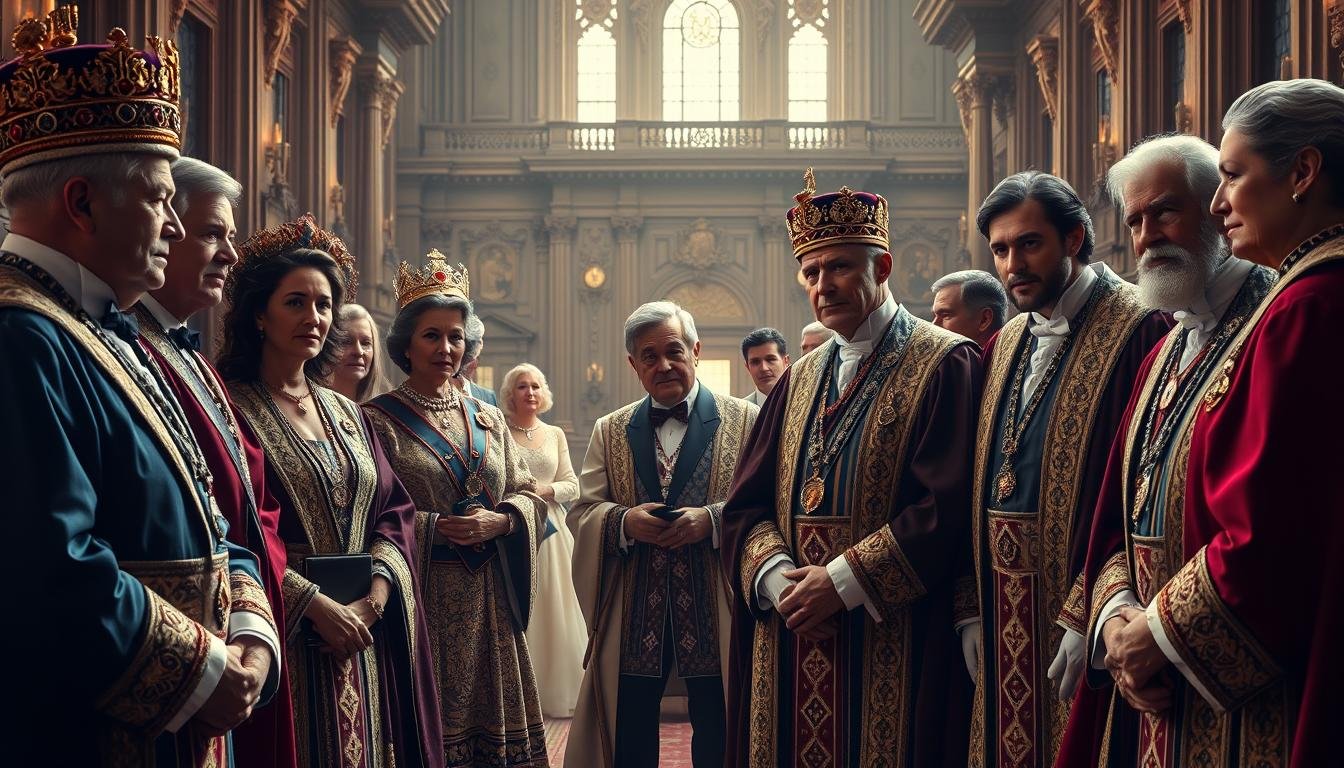
Looking into which members of the royal family are Freemasons will take you back hundreds of years as the British Royal Family has a long history with the Freemasons.
This secret society has been in the United Kingdom for centuries. Many articles have talked about the royal family’s link to Freemasonry.
Freemasonry and the British royalty go way back to the 18th century. Today, there are over 200,000 male and 4,800 female Freemasons in England and Wales. The royal family’s involvement in this secret society has sparked a lot of curiosity and debate.
Key Takeaways
- Freemasonry has a long history with the British Royal Family, dating back to the 18th century.
- Several monarchs and royal family members have been active Freemasons over the centuries.
- The connection between the royal family and Freemasonry has been a subject of intrigue and speculation for generations.
- The organization is closely associated with the monarchy, with over 200,000 male and 4,800 female Freemasons in England and Wales.
- The involvement of British royalty in this secret society has long been a topic of fascination and debate.
The Origins of Freemasonry in British Monarchy
The early 18th century saw Freemasonry’s ties to the British monarchy start. The first Grand Lodge in London was formed on June 24, 1717. This event was key, setting the stage for the masonic connections with the royal fraternity and elite membership.
Early Royal Connections to Masonic Traditions
Many British royals have been part of Freemasonry. King George IV was the Grand Master from 1790 to 1813. This gave Freemasonry a boost in prestige.
Other royals like King William IV and King Edward VII also played big roles. They were part of the elite membership of Freemasonry.
Also see: How To Become A Freemason – 5 Incredible Benefits That Changed My Life
Significance of Royal Patronage
Monarchs’ involvement in Freemasonry has shaped its history. Their support made Freemasonry respected and influential in British society.
“Freemasonry has always been an important part of my life, and I am proud to be a Freemason.” – King George VI
The long-standing masonic connections between the monarchy and Freemasonry are impressive. They show the strong traditions and elite membership of this royal fraternity through the ages.
Which Members Of The Royal Family Are Freemasons
Many members of the British royal family are Freemasons. They have a long history with this group. Freemasonry teaches moral lessons and has secret rituals.
The Duke of Kent, Prince Edward, is the Grand Master of the United Grand Lodge of England. His brother, Prince Michael of Kent, is Grand Master of the Grand Lodge of Mark Master Masons. He also is Provincial Grand Master of Middlesex.
Prince Philip, the Duke of Edinburgh, joined the Navy Lodge No. 2612. But he didn’t often take part in Masonic activities. The Windsor family‘s masonic connections show their elite membership in this old group.
Related post – The Masonic Bible – Here Are At Least 10 Surprising Facts The Haters Don’t Know
Freemasonry has been in the British royal family since the 18th century. Kings like George IV and Edward VII were involved. This tradition shows the windsor family‘s masonic connections and their elite membership.
Historic Royal Freemasons: From George IV to George VI
The British monarchy has a deep connection with Freemasonry. Many monarchs, like King George IV, Edward VII, and King George VI, were part of it.
King George IV’s Masonic Leadership
George IV joined Freemasonry on February 6, 1787. He was the Grand Master of the Premier Grand Lodge of England from 1790 to 1813. He played a big role in linking the monarchy with Masonic traditions.
Edward VII’s Influential Role
Edward VII joined Freemasonry on December 20, 1868. He became the Grand Master of the United Grand Lodge of England in 1874. He held this role until he became king in 1901. His work in Freemasonry made the monarchy and the organization closer.
George VI’s Dedication to the Craft
Prince Albert, later King George VI, joined the Navy Lodge, No. 2612, in 1919. He was the Grand Master of the Grand Lodge of Scotland from 1936 to 1937. He was also a Past Grand Master in the Grand Lodge of Mark Master Masons in 1937. George VI was very involved in Freemasonry, even with his royal duties.
“King George VI wrote a letter in 1951 in which he mentioned the vital role Freemasonry plays in society.”
The Duke of Kent: Modern Royal Masonry Leadership
Prince Edward, the Duke of Kent, has led the royal fraternity for over 50 years. He joined the Prince’s Hall Royal Alpha Lodge No. 16 on December 16, 1963. He has lived by Freemasonry’s principles and traditions ever since.
The Duke has shown strong support for the elite membership of the UGLE. He has attended many events and celebrations during his time. In 2017, he marked the UGLE’s 300th anniversary. He also celebrated his 50th year as Grand Master, showing his deep commitment.
“Freemasonry is about fellowship, it’s about looking after each other, and it’s about looking after the community.”
– Prince Edward, Duke of Kent
Thanks to the Duke, the UGLE has grown and become a close community. His focus on charity, integrity, and support has shaped the UGLE’s modern image.
The Duke’s leadership has left a lasting mark on the UGLE and the British monarchy. His dedication and leadership have made him a key figure in Freemasonry’s history in the UK.
Prince Michael of Kent’s Masonic Achievements
Prince Michael of Kent is part of the British royal family. He has made big contributions to Freemasonry. He has held important positions in the fraternal organization.
Grand Master of Mark Master Masons
Prince Michael is the Grand Master of the Grand Lodge of Mark Master Masons. He oversees the Mark Degree. This is a big part of the Royal Masonic tradition.
Provincial Leadership and Responsibilities
He also serves as the Provincial Grand Master of Middlesex. In this role, he leads Masonic lodges in Middlesex. He makes sure the masonic connections grow there.
Notable Masonic Engagements
- Prince Michael joined Freemasonry in 1974 in the Royal Alpha Lodge No. 16.
- He became Worshipful Master of his lodge in 1977. He has been in many lodges.
- In 1982, his Freemasonry role was made public. He was appointed Provincial Grand Master of Middlesex.
As a royal fraternity member, Prince Michael shows strong commitment to Freemasonry. His leadership and involvement have helped the windsor family in the Masonic community.
Conclusion
The British Royal Family has a big part in Freemasonry’s history. Only three royal members are known Freemasons today. But, the royal family and Freemasonry have a long history together.
The Duke of Kent is the top Freemason in the royal family. This shows the royal family still supports Freemasonry. This support adds to Freemasonry’s prestige, even with some people questioning its secrecy and elitism.
This article looked at how Freemasonry started in the British monarchy. It talked about the first Grand Lodge and how monarchs like George IV and Edward VII were involved. It also mentioned George VI’s role.
Freemasonry is big in the United States too. It’s the largest Masonic country. Freemasons give millions to charity every year.
The royal family’s role in Freemasonry is important, even with some controversies. This shows Freemasonry’s lasting impact on society. As the royal family’s involvement in Freemasonry grows, we’ll see how it changes this mysterious group.
FAQ
What is the connection between the British Royal Family and Freemasonry?
Freemasonry and the British Royal Family go way back to the 18th century. Many royal family members are Freemasons. Today, England and Wales have over 200,000 male and 4,800 female Freemasons.
Which members of the Royal Family are Freemasons?
Three members of the Royal Family are known Freemasons. The Duke of Kent, Prince Edward, is the Grand Master of the United Grand Lodge of England (UGLE). His brother, Prince Michael of Kent, is Grand Master of the Grand Lodge of Mark Master Masons.
Prince Philip, Duke of Edinburgh, was a Freemason but didn’t do much with it.
What is the history of Freemasonry within the British Monarchy?
The first Grand Lodge was set up in London in 1717. King George IV was one of the first monarchs to join, becoming Grand Master from 1790 to 1813. Other early royal Freemasons included William IV and Edward VII.
How have the British monarchs been involved in Freemasonry?
King George IV was Grand Master from 1790 to 1813. Edward VII joined in 1868 and became Grand Master in 1874. He kept this role until he became king in 1901.
King George VI joined the Navy Lodge in 1919. Edward VIII was also a Freemason, starting in 1919.
What is the current role of the Duke of Kent in Freemasonry?
The Duke of Kent, Prince Edward, is the Grand Master of the United Grand Lodge of England (UGLE). He joined in 1963. He has been involved for over 50 years.
What other roles do members of the Royal Family have in Freemasonry?
Prince Michael of Kent is Grand Master of the Grand Lodge of Mark Master Masons. He is also Provincial Grand Master of the Provincial Grand Lodge of Middlesex. He joined in 1974 and became Worshipful Master in 1977.












